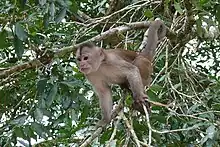Marañón white-fronted capuchin
The Marañón white-fronted capuchin (Cebus yuracus) also or known as Peruvian white-fronted capuchin or Andean white-fronted capuchin is a species of gracile capuchin monkey from the upper Amazon Basin. It had been regarded as synonymous with the shock-headed capuchin (C. cuscinus), which was then considered a subspecies of Humboldt's white-fronted capuchin, but it was classified as a separate species by Mittermeier and Rylands based on genetic studies by Boubli.[2][3][4]
.jpg.webp)
| Marañón white-fronted capuchin | |
|---|---|
 | |
| Scientific classification | |
| Domain: | Eukaryota |
| Kingdom: | Animalia |
| Phylum: | Chordata |
| Class: | Mammalia |
| Order: | Primates |
| Suborder: | Haplorhini |
| Infraorder: | Simiiformes |
| Family: | Cebidae |
| Genus: | Cebus |
| Species: | C. yuracus |
| Binomial name | |
| Cebus yuracus (Hershkovitz, 1949) | |
The Marañón white-fronted capuchin lives in wet forests of the upper Amazon basin in southern Colombia, eastern Ecuador, northeastern Peru and likely eastern Brazil.[2][3] Males have a head and body length of about 43 cm (17 in) with a tail length of about 47 cm (19 in).[2] Females have a head and body length about 37 cm (15 in) with a tail length of about 45 cm (18 in).[2]
Marañón white-fronted capuchins sometimes formed mixed groups with the Ecuadorian squirrel monkey.[2][3]
References
- de la Torre, S.; Lynch Alfaro, J.W.; Heymann, E.W.; Shanee, S.; Moscoso, P. (2021). "Cebus yuracus". IUCN Red List of Threatened Species. 2021: e.T4076A191701887. doi:10.2305/IUCN.UK.2021-1.RLTS.T4076A191701887.en. Retrieved 25 July 2022.
- Mittermeier, Russell A.; Rylands, Anthony B. (2013). Mittermeier, Russell A.; Rylands, Anthony B.; Wilson, Don E. (eds.). Handbook of the Mammals of the World: Volume 3, Primates. Lynx. p. 407. ISBN 978-8496553897.
- Jack, Katherine M. (2016). Rowe, Noel; Myers, Marc (eds.). All the World's Primates. Pogonias Press. p. 294. ISBN 9781940496061.
- Boubli, Jean P.; et al. (2012). "Cebus Phylogenetic Relationships: A Preliminary Reassessment of the Diversity of the Untufted Capuchin Monkeys" (PDF). American Journal of Primatology. 74 (4): 1–13. doi:10.1002/ajp.21998. PMID 22311697. S2CID 12171529. Retrieved 2018-12-30.
